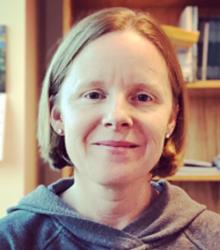
Lina Shanley
Biography
Dr. Lina Shanley worked as a special education teacher in Oakland, CA prior to moving to the University of Oregon. She received her mild/moderate disabilities teaching credential and Masters in Special Education from San Francisco State University while working as a Resource Specialist for the Oakland Unified School District.
Currently, Dr. Shanley is a Research Assistant Professor at the Center on Teaching and Learning. She is an investigator on several federally funded grants to develop and examine the efficacy of early mathematics intervention programs delivered in both in-person and technology-based contexts. She is a co-Project Director for the NumberShire Integrated Tutor System and also codirects a grant aimed at better understanding mathematics intervention response via neuroimaging.
Education
PhD, 2014, University of Oregon, Eugene, OR
Major: Quantitative Methodology and Measurement
MA, 2010, San Francisco State University, San Francisco, CA
Major: Special Education
BA, 2000, Whitman College, Walla Walla, WA
Major: History
Publications
Shanley, L., Biancarosa, G., Clarke, B., & Goode, J. (2019). Relations between mathematics achievement growth and the development of mathematics self-concept in elementary and middle grades. Contemporary Educational Psychology, 59. Advance online publication. doi: 10.1016/j.cedpsych.2019.101804
Shanley, L., Clarke, B., Anderson, D., Turtura, J., Doabler, C., Kurtz-Nelson, E., & Fien, H. (2019). Exploring the utility of assessing early mathematics intervention response via embedded assessment. School Psychology, 34(5), 541-554. doi: 10.1037/spq0000326
Shanley, L., Strand Cary, M., Turtura, J., Clarke, B., Sutherland, M., & Pilger, M. (2019). Individualized instructional delivery options: Adapting technology-based interventions for students with attention difficulties. Journal of Special Education Technology. Advance online publication. https://doi.org/10.1177/0162643419852929
Shanley, L., Clarke, B., Doabler, C. T., Kurtz-Nelson, E., & Fien, H. (2018). Measuring early mathematics knowledge via early number skills and task types. Mathematical Thinking and Learning, 20(4), 324-336. doi: 10.1080/10986065.2018.1509419
Clarke, B., Shanley, L., Kosty, D., Strand Cary, M., Baker, S. K., Fien, H., & Smolkowski, K. (2018). Investigating the incremental validity of cognitive variables in early mathematics screening. School Psychology Quarterly, 33(2), 264-271. doi: 10.1037/spq0000214
Shanley, L., Clarke, B., Doabler, C. T., Kurtz-Nelson, E., & Fien, H. (2017). Early number skills gains and mathematics achievement: Intervening to establish successful early mathematics trajectories. Journal of Special Education, 51(3), 177-188. doi: 10.1177/0022466917720455
Shanley, L., Strand Cary, M., Clarke, B., Guerriero, M. A., & Thier, M. (2017). Instructors’ technology experience and iPad delivered intervention implementation: A mixed methods replication study. Educational Technology Research and Development, 65(4), 815-830. doi: 10.1007/s11423-016-9488-8
Shanley, L. (2016). Evaluating longitudinal mathematics achievement growth: Modeling and measurement considerations for assessing academic progress. Educational Researcher, 45(6), 347-357. doi: 10.3102/0013189X16662461
Research
Dr. Shanley’s research interests are nested broadly within the fields of numerical cognition and special education. Her primary line of inquiry involves identifying factors associated with mathematics development among at-risk students. Within this frame, much of her current work focuses on how students acquire early number concepts with the aim of improving intervention response via increasingly efficient screening processes and targeted intervention practices. Dr. Shanley is currently working to forge multi-disciplinary research partnerships in education, cognitive science, and neuropsychology to better understand early mathematics development and factors that affect responsiveness to intervention.
